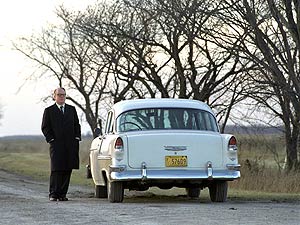|
Audio
Photos
|
 |
| Philip Seymour Hoffman portrays Truman Capote who used the horrific murders of a Kansas family to create a new literary form, the non-fiction novel. (Image courtesy Sony Pictures Classics) |
St. Paul, Minn. — Bennett Miller is a quietly studious man, with a shock of dark curly hair. He clearly likes to think things out. When asked why he chose to tell this story and why he wanted to tell it now, he responds with question of his own: do we want the quick answer, or the five minute answer, (which is clearly going to take more than five minutes.)
He says it's Truman Capote's story, but it's really larger than that.
"What it's about is a guy, Truman Capote, who wants something so badly he doesn't really care what he does and what the consequences are to what he does, to getting what he wants," Miller says.
The film follows Capote and his childhood friend Harper Lee, who would just months later win the Pulitzer for "To Kill A Mockingbird." They go to find the story behind the horrific murders of the Clutter family in Holcomb, Kansas.
"What attracted Capote to this story is the notion of loss of innocence," Miller says. "There was four members of this family discovered, tied up and shot-gunned in their faces in rural Kansas in 1959. It's the middle of the century, in the middle of the country, and Capote was fascinated by not the question of who did these murders, but how is it effecting the people of the town. Kind of in a 9-11 way, these people lives are changed forever."
What Capote did with that story has been the subject of admiration and controversy ever since. Capote dreamed of creating a new genre: the non-fiction novel. He wanted it to be so good it would be considered great literature.
While the people of Holcomb were initially hostile to the effete and openly gay Capote, he quickly befriended them. He also later befriended the two men arrested and convicted of the killing.
It took Capote until 1966 to finish "In Cold Blood," but the book became an instant classic that changed the face of journalism.
Bennett Miller says that success came at a price. Capote was prepared to betray all of the friendships he'd made for the sake of the book. One of the killers, Perry Smith saw Capote as a possible savior, but Capote didn't help him. The author knew he needed the killers executions as the climax of the book.
Miller says in the title role Phillip Seymour Hoffman captures Capote's genius and blind ambition perfectly.
"He is an actor who has no vanity," Miller says of Hoffman. "This is an ugly character. It is a very charismatic, very dynamic, and can be fun character. But deep down it is an ugly thing, the qualities that are driving him, his ambition, his desire, and what he is willing to do are not attractive things, and he goes for it without vanity.")
Getting back to that question of why this film now, Miller says it just felt right. He hopes it will entertain and intrigue. "It's not a biopic," he says firmly. "It's a drama. It's actually, in American form, about as close as you can come to a classic tragedy."
Director Bennett Miller says the excitement around his first film is gratifying. But now he is going to take some time to, as he puts it, survey the new landscape to see what it holds for him.






